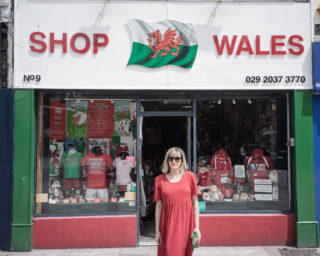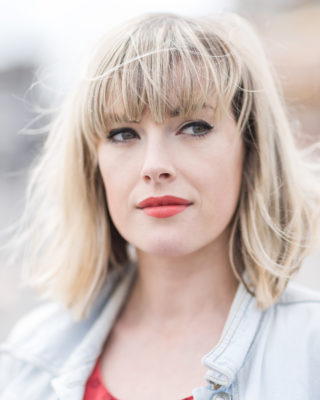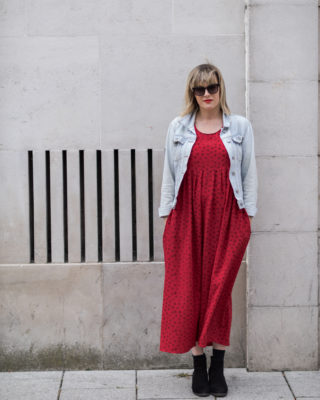Gwenno Saunders walked us around her hometown of Cardiff
A City instrumental to her political Welsh language LP, ‘Y Dydd Olaf’.

A City instrumental to her political Welsh language LP, ‘Y Dydd Olaf’.
Hometowns are like family members – you can slag off your own, but nobody else’s, not even in agreement. To say: “Yeah, maybe you’re right, it does feel a little rundown around here,” you might as well have said: “The only thing that smells worse than your mum’s cooking is your dad.” That’s not on.
Gwenno Saunders has a love/hate relationship with Cardiff that is familiar to all of us, that ultimately stems from frustration at unfulfilled potential. The council keeps flattening buildings, having fully embraced a new-is-always-better approach to city planning, and Saunders worries about that a lot. When she meets me direct from my train to Cardiff Central, she voices her concern as soon as we’ve said hello to one another. She gestures towards the bus shelters in front of the grand station. “They’ve never really known what to do with this area, and now they’re going to build a BBC headquarters here. I’m worried it’s going to look like a government outpost building, or something.”
Gwenno has offered to give me a rough tour of Cardiff – a city I’d never been to, and one that has greatly influenced her debut solo album, ‘Y Dydd Olaf’, released for a second time this month, following a limited pressing at the end of 2014. As you can probably guess, it’s a very Welsh record – only one track isn’t sang in Saunders’ mother tongue, and that track (the closing ‘Amser’, written as a poem by her father some years ago) plumps for Cornish over English. Sounds like it might be an album of trad-folk performed on upturned barrels, but ‘Y Dydd Olaf’ (which translates as ‘The Last Day’) takes its musical cues from the breezy side of 1970s krautrock, Broadcast’s tempered neo-psych and Welsh electronic artists like Malcolm Neon, Geraint Ffrancon and R. Seilog. “I was wanting to find an industrial element in Welsh culture,” Saunders tells me, “because what frustrated me in the past was that I don’t play the acoustic guitar; I don’t sing nicely these conventional songs.
“I liked that krautrock was European,” she says. “I loved that, because we’re so bombarded by American culture. And rhythmically, not being a huge rock fan, it was the motorik beat that got me.”
We walk down Cardiff High Street to the city’s castle and a statue of NHS founder Aneurin Bevan (“The pointy man”), as Gwenno references Welsh literary and historic figures that I pretend I’ve heard of. She’s well read on architecture, too, and is eager to show me the brutalist St. David’s Hall – a concert hall that “should book more interesting things than it does.” If ‘Y Dydd Olaf’ was a building, it would look like St. David’s Hall – a retro-futurist vision of a practical, modern world.
‘Y Dydd Olaf’ takes its name – and a fair share of inspiration – from a 1976 science fiction novel by Welsh nuclear scientist Owain Owain. His Y Dydd Olaf is a dystopian tale of robots taking over the planet and turning humans into a race of clones. Like George Orwell before him, and, more similarly in plot, Aldous Huxley’s Brave New World, the accuracy of Owain’s imagined future society is alarming as we drift through what is essentially a faceless city centre. Owain wrote his book in diary form, in Welsh – a language the robots are unable to decipher. “It’s a truly inspired way of expressing the power and importance of cultural diversity in an increasingly globalised world,” notes Saunders. She’s spoken Welsh all her life, which puts her in the 20% of the country who know and speak their own language. I’d be proud of that, too, and Cardiff, she tells me, has been slow to celebrate its national identity through language. “It has really grown, though,” she assures me. “You hear Welsh in the street now. I remember when we used to walk around when I was little, my mum would be like, ‘shhhh, listen… someone’s speaking Welsh’, and it would be a really exciting thing.
“More than one language is great for you anyway,” she says, “regardless of what you think the value of that language is. It is of value because it’s part of your identity and where you’re from.”
Inside St. David’s Hall we’re asked if we’re here for the gypsy and traveller convention. We’re not, but Gwenno asks if we can go upstairs to have a look. She grew up surrounded by Celtic culture, in a household that played traditional Irish music, as well as Welsh protest songs and Cornish and Breton artists. Gwenno’s mother has sung in the Socialist Street Choir for 30 years, and she would teach her daughter anti-apartheid songs as a child; her father is a Cornish poet and linguist, which has furthered her respect for endangered languages and cultures. (Just 200 people now speak Cornish – Gwenno and her father are 2 of them). She has one younger sister, and says that her childhood in the inner-city area of Riverside “was almost like being brought up in a cult.”
“I wasn’t brought up on any English music at all,” she says, “and I didn’t really like pop music when I was little. I remember when everyone got into Kylie and I was like, ‘urgh, it’s horrible!’ And then, as I got older, all the posh people in school listened to Brit Pop, and I thought I’m not going to listen to that, because it’s really white and really boring and I can’t see any sex it in. I was 14 – where was the sex? So I got into really bad slow jams, like Jodeci. Cardiff is a bit of a slow jam city, even now. On the radio station we’re on [Gwenno hosts an experimental music show on Cardiff Radio with her husband Rhys Edwards, who also produced ‘Y Dydd Olaf’ and released it the first time around on his label Peski Records] all they play is slow jams – R Kelley, Brandy, Mary J Blige. It might as well be 1992.”
She half jokes that she was always mad at her mum as she had to play catch-up in her teens. “People at school were saying Oasis are just copying The Beatles, and I didn’t know who that was. It would have helped my credibility if I had known who David Bowie was at the right time.”
A rebellious student who hated school, by the time she was 16, Gwenno was itching to leave Cardiff and got the opportunity to do so in an Irish dance show. You’ve probably heard of it – it’s called Lord of The Dance. She saw it as nothing more than a way out, and moved to Las Vegas. She had a good time, for a time, and found sanctuary in electronic music when she wasn’t feeling so great about the world’s strangest city.
“I’d go to this club called Utopia,” she tells me, “off the strip. It was where all the people who worked in the hotels went. It was probably quite terrible music – euphoric house and trance, and all of these terrible things that were happening in America at the time – but from then I always wanted to make electronic music, and it was the things that I related to the most.
“It was when a lot of the Welsh bands came through that I thought, they’re from Wales! We’re part of the world as well! We’re not this ‘other’, which, culturally, Wales was. ‘This desert business is getting a bit boring now – I need to come back.’”

Gwenno didn’t move back to Cardiff for long, and I can see how she ended up joining conceptual pop band The Pipettes, and relocating once again to Brighton. The polka-dot dress-up; the ’60s doo-wop homage; the saccharine pop melodies and choreographed dance moves – they’re a far cry from a sci-fi krautrock project performed almost entirely in Welsh, but a much shorter walk from Michael Flatley’s touring behemoth. “I thought, yeah, I know how to do that,” she says, “put a costume on and get on stage.
“It was a really good education,” she says of the group, which she left in 2010. “It was one that I really needed, because I wasn’t particularly confident in myself or as a musician when I joined. I was exposed to a lot of different music, but it was very restricting, and it was impossible to manoeuvre within it. You did have to play a role and a character, and I’m not an actor, and I wasn’t very good at that – I don’t think I was very convincing. I didn’t even change my name [others did, to things like Monster Bobby and RiotBecki].
“The friendships were important, but there was a lot of frustration as well. It was very restricting – I mean, you’re wearing the same dress every night. It’s weird… but great. I don’t think any of us are the same people we were.
“The album that I’ve made is what I am really,” she says – a socialist, a feminist, a person engaged in local and global political debate, an artist deeply concerned by media manipulation, government surveillance and the institutionalised deconstruction of communities and their historic cultures. ‘Y Dydd Olaf’, while dreamy in sound and soft on the ears, is a cry for resistance, and its lyrics sheet (whether in Welsh or English translation) makes for bleak and inspiring reading. ‘Don’t, don’t forget that your heart is in the revolution,’ goes the opening ‘Chwyldro’ (‘Revolution’), while the following ‘Patriarchaeth’ (‘Patriarchy’) forebodes: ‘The sack is heavy, the road is steep / Your humanity is still up for sale.’ “The more information that’s available to you via new technology, the more aware you become of the startling inequality between the sexes,” says Gwenno. “I would go as far as to say too that as a minority culture, Wales can at times fall into an even more conservative and narrow view of gender roles in public life, which is as much to do with the size of the population as it is to do with opportunity, of course. With ‘Patriarchaeth’ I’m trying to express what sexism feels like for a woman living in a patriarchal society.”
“The Internet highlights it,” she says, “because obviously porn has become such a big part of culture and peoples’ lives, it really puts women’s issues at the forefront, really. There have been periods where woman have been like, ‘well, if I’m selling my body and I’m making the money from it, I’m winning’. And I think woman are beginning to turn around on that idea and realise just how exploitative it is, unfortunately.”
Elsewhere, Gwenno celebrates Cardiff’s marginalised visual arts community on ‘Golau Arall’ (‘Another Light’) – “A song to remind you that in the darkest times it’s important not to lose faith in art,” she says, a view not vocalised enough by musicians as the Arts face five more years of aggressive Tory cuts – and laments the city’s biggest community casualty at the hands of developers on ‘Sisial y Môr’ (‘The Whispering of the Sea’).
We travel to this area down by the docks on a single carriage train. It’s called Butetown and is also referred to as Tiger Bay – a place name famed for being the birthplace of Shirley Bassey. Bassey’s story is the ultimate tale of local-girl-done-good, made all the more inspiring by the fact that she grew up in this part of town, as the daughter of Nigerian and English migrants. What Butetown always lacked in affluence it more than made up for in multi-culturalism, and at one time over 50 different nationalities lived in these streets that are now largely derelict.
Gwenno takes me past one disused tavern after the next, around the corner to a mighty period building that looks like it could have once been a grand hotel, and could even become that again. It’s actually the dock’s old Coal Exchange, but the point remains – a building as great as this shouldn’t be a boarded up ruin.
Gwenno constantly expresses her disappointment in Butetown’s neglect and unfulfilled potential, even before we catch the train there. Walking around the ghostly streets it makes you realise that there’s a place for gentrification – at least then some of these historic buildings would be in some use. Or, better still, perhaps Cardiff council shouldn’t have relocated its immigrant community to the outskirts of the city, seemingly to allow a large neighbourhood to fall into disrepair until it’s able to sell it off to developers. That’s what Gwenno is convinced has happened here, and in Butetown we arrive at her greatest frustration at the town that made her.
She sticks her head into the doorway of a Polish florists and café to say hello to the owners (they’ve recently moved premises), and we go for lunch at a Portuguese café she recommends, but there’s little else going on around here. “I just think that would make a really nice art space or little theatre,” she says more than once as we walk, and it’s true of all the buildings it’s applied to.
“Other parts of Wales have really strong identity,” Gwenno tells me in the café, “and I’ve always envied people from small towns in the valleys who are from this place, and they’ve stuck to it, and they’re of it. Because Cardiff has changed so much, it’s a little more wishy-washy.
“Cardiff has this delusion of grandeur, and you’ve got to admire that ambition – ‘Good for you, you want to be a big American city!’ but it hasn’t celebrated its multiculturalism enough, or preserved its own, historic identity. I’m constantly searching for the true nature of Cardiff – I’m constantly trying to find a root to it, to find an ownership.”
“[With the track ‘Sisial y Môr’] I am trying to express my disappointment with the lack of vision that Cardiff City Council has with regards to town planning on the whole.”

Touring the world with the dance group in her teens and with The Pipettes through her twenties, Gwenno returned to Cardiff in 2011 in a relatively unique position – as a Welsh language musician with world experiences and influences.
Living in England, it had felt strange to make music with Welsh lyrics, having spent the whole day communicating in English, but now that she was home in Wales, the opposite was true. She made ‘Ymbelydredd’ (‘Radiation’) an EP about murdered prostitutes, collapsing ceilings, 50p dance lessons and using soap as a toothpaste substitute – life growing up in ’80s Cardiff, in other words.
After five years of ‘pulling shapes’ in a melodic pop group on the peripheries of the mainstream, Gwenno Saunders was now eliminating all expectation by proceeding to make music in her own minority language. “And that was brilliant,” she says. “‘Let’s make a record in Welsh and Cornish, because there’s no expectation there at all!’ It’s the biggest freedom you can find. There are other ways to do it, other than linguistically, with really challenging music – music that’s far more challenging than what we’ve made – but that was so exciting. It wasn’t aimed at anybody. Welsh records don’t sell. They generally get made so that they exist. That’s the aim.”
Before we walk back to Cardiff Central Station I ask Gwenno if she’d ever consider running for the city council. I half expect her say yes – as the concerned, proud local girl full of proactive passion for change and frustration towards a familiar, unsympathetic government body; as the gung-ho spirit who moved to Vegas at the age of 16, joined a pop band on a whim, appeared in a Welsh soap opera and who currently co-hosts a weekly experimental music radio show that earlier this year promoted its first visual art and music festival, Cam ’15. The answer she actually gives me highlights the common thread in all of those varied ventures. Gwenno Saunders, I’m reminded, is a creative, not a bureaucrat.
“Y’know what,” she says, “I think there’s a lot to be said for being really interested in the way things are ran, and then just making art. I’m really into that idea, because art and culture is the last outpost of freedom of some kind in this globalised, capitalised world.”